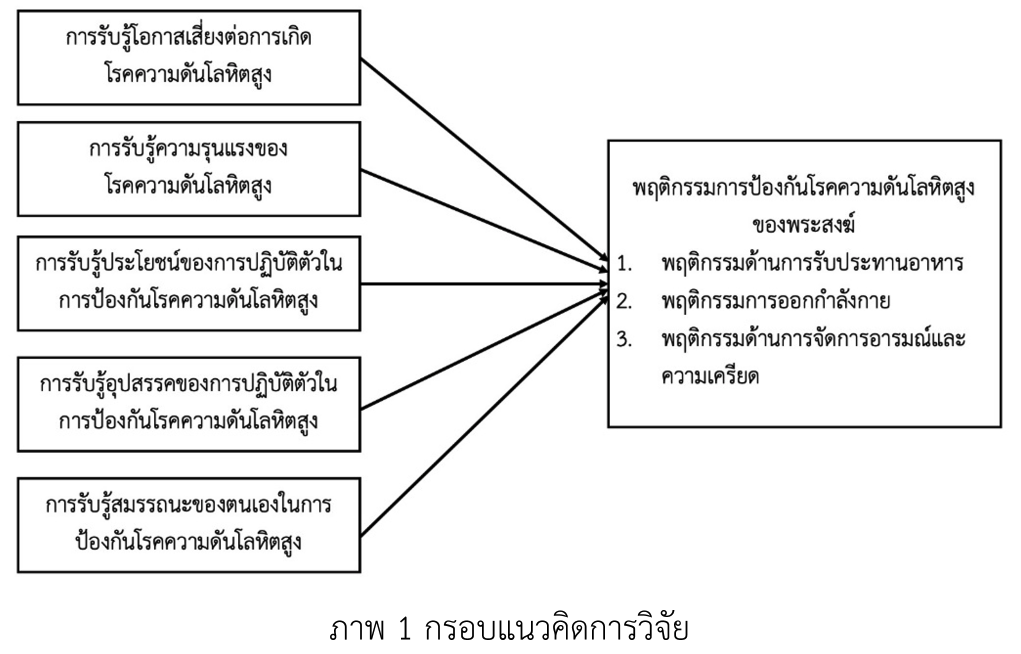FACTORS PREDICTING HYPERTENSION PREVENTIVE BEHAVIORS AMONG MONKS IN MUEANG DISTRICT, CHIANG RAI PROVINCE
Keywords:
hypertension preventive behavior, Buddhist monkAbstract
This predictive research focused on hypertension preventive behavior and related influencing factors among monks in Mueang District, Chiang Rai Province. The sample size calculated using G* Power 3.1 software resulted in 111 monks aged 20 years and over in Mueang District, Chiang Rai Province. Data collection tools included a health belief plan questionnaire on preventing hypertension for monks, divided into five aspects: perceived risks, perceived severity, perceived benefits of practice, perceived barriers to practice, and perceived self-efficacy in preventing hypertension. Additionally, a hypertension preventive behavior questionnaire for monks was utilized. The instruments were tested for reliability and validity, with Cronbach’s alpha coefficients of .93 and .70, respectively. Data were analyzed using descriptive statistics and logistic regression analysis.
The results indicated that most monks in Mueang District, Chiang Rai Province, had a moderate level of hypertension preventive behaviors (76.6%). Factors predicting hypertension preventive behaviors among these monks with statistical significance were perceived risks
(OR = .07, 95%CI = .01 - .47, p = .01), perceived benefits of practice (OR = 33.31, 95%CI = 2.47 - 448.62, p = .01), and perceived self-efficacy in preventing hypertension (OR = 12.83, 95%CI = 3.35 - 49.10, p = .00). These factors, together, could predict 36% of the hypertension preventive behaviors.
Downloads
References
Banchao, A. (2022). Health promotion behaviors among buddhist monks in regional health promotion center 2 Phitsanulok. Retrieved from https://hpc2service.anamai.moph.go.th/researchhpc2/file/227.pdf
Bandura, A. (1977). Self-efficacy: Toward a unifying theory of behavioral change. Psychological Review, 84(2), 191–215.
Caltabiano, M. L., & Sarafino, E. P. (2002). Health psychology: Biopsychosocial interactions, An Australian perspective. John Wiley & Sons.
Chotikasathit, S., & Pongpieng, S. (2010). Health status and self-health care behaviors of monks in Amphur Muang, Ranong. Lanna Public Health Journal, 6(3), 297-307.
Department of Disease Control. (2022). Advises people to pay attention to their health, measure your blood pressure regularly, prevent high blood pressure. Retrieved from https://ddc.moph.go.th/brc/news.php?news=25290&deptcode=brc&news_views=388
Department of Health. (2022). Guidelines for the implementation of health promotion temples for the year 2022. Retrieved from https://apps.hpc.go.th/dl/web/upFile/2021/11-10169-20211102131650/0399382c978463d6646f3c476bda5127.pdf
Department of Medical Service. (2017). Statistics of Thai monks get sick 5 disease from food. department of health, Ministry of public health. Retrieved from https://news.thaipbs.or.th/content/254049
Division of Non Communicable Diseases. (2022). World hypertension day. Retrieved from http://www.thaincd.com/2016/news/hot-news-detail.php?id=14345&gid=18
Hinkong, W.. & Thongbai, J. (2022). The factors predicting cardiovascular disease preventive behaviors among monks in Sesaket province in Thailand. Journal of Social Science and Buddhistic Anthropology, 7(4), 396-411.
Luenam, A., Ngamkham, N., Sangsawang, D., Pengpanich, W., & Rattanasuwannachai, K. (2019). Predictive factors of self-care behavior for prevention of hypertension among population group at risk. HCU journal of Health Science, 23(1), 93–106.
Marcellus, L. (2004). Are we missing anything? Pursuing research on attrition. Canadian Journal of Nursing Research, 36(3), 82-98.
Mheeaium, P. (2020). Factors effect with health behavior of monks in Takhli district, Nakhonsawan province (Master of public health program). Graduate School, Naresuan University, Phitsanulok.
Onsrinoi, N., Leelukkanaveera, Y., & Toonsiri, C. (2017). Predictive factors of hypertension preventive behaviors among people with per-hypertension. Songklanagarind Journal of Nursing, 37(1), 63-74.
Phithiyanuwat, C., Ophasshathikhun, P., Kantathammo, P., Thavaro, P., & Yodboon, P. (2021). Health behavior and health promotion guidelines of monks in Mueang district, Chachoengsao province. Retrieved from https://lpn.mcu.ac.th/mculpn/wp-content/uploads/2021/03/A-040-.pdf
Pintadong, R. (2022). Food consumption behavior of monks in temples at Dusit district, Bangkok. Technical Education Journal: King Monkut’s University of Technology North Bangkok, 12(1), 119-126.
Priest hospital. (2012). Priest hospital invites you to join the campaign to lose weight and reduce the belly of the monks. Retrieved from http://www.thaihospital.org/board2/index.php?topic=4437
Rerkluenrit, J., Ngensod, M., Wihok, K., Dachadilok, N., Jaikordee, S., Karnchen, A., . . . Toso, P. (2010). Factors predicting health-promoting behavior among Buddhist monks in Nakhonnayok province, Thailand. Thai Pharmaceutical and Health Science Journal, 5(4), 333-343.
Rosenstock, I. M., Strecher, V. J., & Becker, M. H. (1988). Social learning theory and the health belief model. Health Education Quarterly, 15(2), 175–183.
Saetia, Y. (2019). Factors predicting hypertension preventive behaviors among persons at risk to hypertension (Master of nursing science program, adult nursing). Faculty of Nursing Burapha University, Chon Buri.
Sararak, M., Sungwalee, W., & Khampangsri, W. (2017). Prevalence and factors associated with chronic illness of monks in Amphoe Warinchamrab, Ubon Ratchatani province. Journal of Science and Technology, Ubon Ratchathani University, 19(1), 38-49.
Seemanee, S., Mattavagkul, C., Poomrittikul, P., Ditajorn, R., & Trangkasant, P. (2018). Factors related nutrition consumption behaviors of monks and foodstuff dedication behaviors to the Buddhist monks of people in Phasicharoen district, Bangkok. Journal of Nursing, Siam University. 19(37), 22-38.
Srisatidnarakul, B. (2019). Effect size, power analysis, optimal sample size calculations using G*power software (4th ed.). Bangkok: Chulalongkorn University Printing House.
Sukrueangkul, A., Vannarit, T., Boonsoi, P., & Autsri, P. (2017). Factors predicting health promoting behaviors among. Nursing Journal, 44(Supplement), 38-48.
Thai Health Promotion Foundation. (2013). The urgent situation of the health of monks. Retrieved from http://www.manager.co.th/QOL/ViewNews.spx?NewsID=9560000064131
Thai Hypertension Society. (2019). Guidelines in the treatment of hypertension 2019. Retrieved From http://www.thaihypertension.org
Thato, R. (2018). Nursing research: Concepts to application (4 edition). Bangkok: Chulalongkorn University Printing House.
Viriyo, P. A. (2022). Selection of persons to enter the Sangha organization according to the principles of dharma and discipline and the rules of the Sangha Sangha council. Journal of Buddhist Innovation Review, 3(2), 52-64.
Wirochano, W. P., Suksatit, B., Samerchua, W., & Singmanee, C. (2019). Situational analysis of health based on the concept of Bhavana 4 among buddhis monks in Phichit province. Journal of MCU Social Science Review, 8(3), 15–27.
World Health Organization. (2020). Guidelines on physical activity, sedentary behaviour. Geneva: World Health Organization.
World Health Organization. (2023). Hypertension. Retrieved from https://www.who.int/news-room/fact-sheets/detail/hypertension
Wuttisaksakul, K. (2018). Factors related to health behaviors of monks in Fang district, Chiangmai. Journal of Nurses Association of Thailand Northern Region, 24(1), 71–83.

Downloads
Published
How to Cite
Issue
Section
License
Copyright (c) 2023 JOURNAL OF THE POLICE NURSES

This work is licensed under a Creative Commons Attribution-NonCommercial-NoDerivatives 4.0 International License.
ผลงานที่ได้ตีพิมพ์แล้วจะเป็นลิขสิทธิ์ของวารสารพยาบาลตำรวจ














